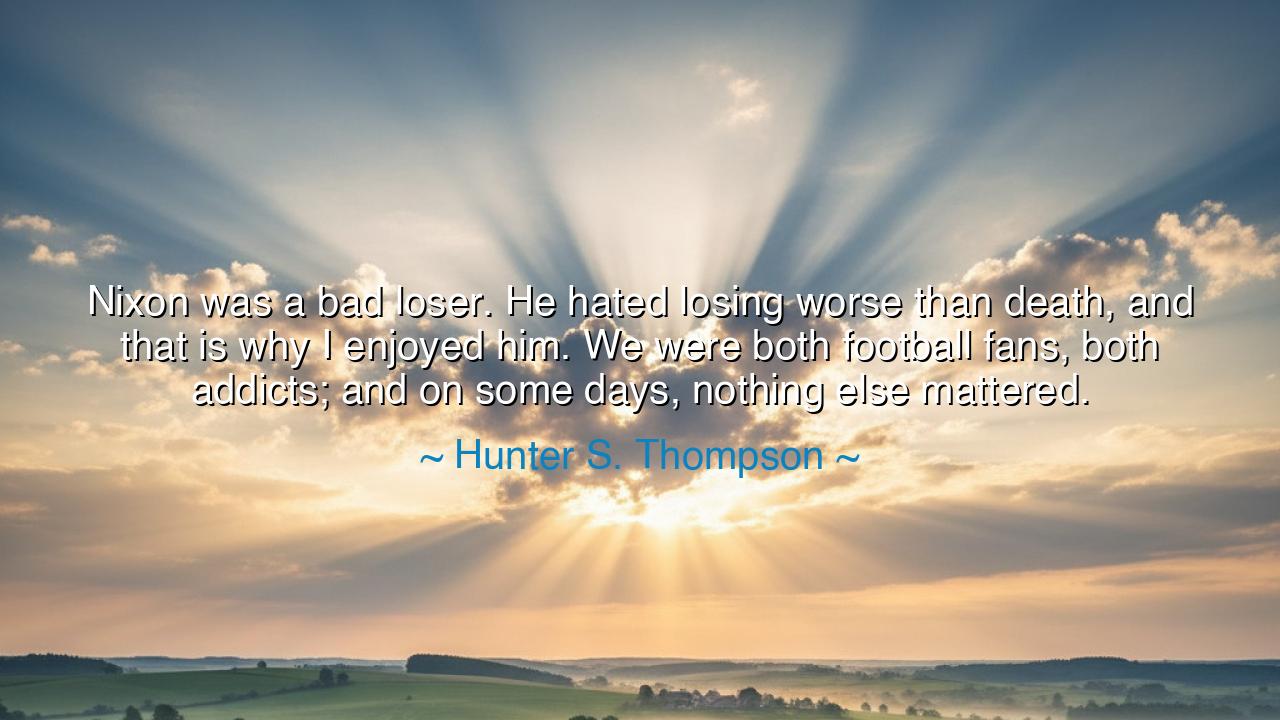
Nixon was a bad loser. He hated losing worse than death, and that
Nixon was a bad loser. He hated losing worse than death, and that is why I enjoyed him. We were both football fans, both addicts; and on some days, nothing else mattered.






In the fiery and paradoxical words of Hunter S. Thompson, the prophet of rebellion and chronicler of American madness, we find a reflection both personal and mythic: “Nixon was a bad loser. He hated losing worse than death, and that is why I enjoyed him. We were both football fans, both addicts; and on some days, nothing else mattered.” Here, Thompson, who spent his life wrestling with power, truth, and his own demons, reveals not just an opinion of Richard Nixon, but a glimpse into the soul of the eternal competitor—the man who fears not disgrace nor defeat, but the annihilation of self that losing represents. In this strange confession of admiration for his sworn enemy, Thompson reminds us that even the wicked possess virtues the world misunderstands: tenacity, hunger, and the will to fight to the bitter end.
Hunter S. Thompson and Richard Nixon were, by every measure, opposites. One was the anarchic journalist, the outlaw poet of truth; the other, the calculating statesman, the embodiment of political deceit. Yet both men were obsessed with struggle—with the relentless contest that defines the human spirit. Thompson saw in Nixon not merely corruption, but a raw, animal force—the addiction to victory, the lust for domination that drives warriors and tyrants alike. When he says “we were both football fans,” he is not speaking of sport, but of philosophy. Football, for both men, symbolized combat, territory, and glory earned through violence. It was a mirror of life itself: brutal, competitive, and fleeting.
To call Nixon a bad loser is to define him entirely. His life was a cycle of triumph and paranoia, of ascents poisoned by fear of the next fall. Even in victory, he imagined betrayal; even in power, he felt hunted. This hatred of losing was not vanity—it was existential terror, the belief that defeat was death of identity. For Nixon, losing the presidency was not the end of a career, but the death of his self-conceived myth. And for Thompson, who lived in the shadows of his own obsessions—drugs, deadlines, danger—this manic refusal to yield was both monstrous and magnetic. They were two men on different sides of morality, yet bound by the same fever: the unwillingness to quit.
History, too, is filled with such men—souls consumed by the same fire. Alexander the Great, who wept when there were no worlds left to conquer, and Napoleon, who, after his downfall, tried to reclaim empire from exile. They could not bear the quiet of defeat. Their victories, though glorious, were built upon the same addiction that devoured them. Thompson’s Nixon belongs to this lineage: not noble, but titanic in spirit—a man destroyed by his own refusal to accept loss. And Thompson himself, though he mocked Nixon with venom, saw in him a reflection of his own restless energy, the same hunger that drives creators and destroyers alike.
When Thompson says “we were both addicts,” he confesses more than he accuses. His addiction was not only to drugs or adrenaline—it was to intensity, to the feeling that life mattered only when the stakes were unbearable. In Nixon, he recognized that same disease of the will. They were, in their own ways, slaves to obsession. And when he writes, “on some days, nothing else mattered,” he reveals the tragedy of those who live by passion alone: that beneath their greatness lies emptiness. The flame that gives them purpose also consumes them.
Yet within this storm lies a lesson worthy of remembrance. Ambition, if left unchecked by wisdom, becomes madness. Pride, when untempered by humility, becomes poison. Thompson admired Nixon’s hatred of defeat not because it was good, but because it was true—it was honest in its ugliness. In a world that praises hollow virtues, there is something terrifyingly pure about the man who will not pretend to love losing. But such purity leads only to ruin. The wise must learn to fight fiercely and to lose gracefully, to let defeat teach them what victory cannot.
And so, my children, take this wisdom as fire and caution both: strive mightily, but do not let striving consume your soul. Learn from Hunter S. Thompson, who saw truth even in his enemy, and from Nixon, who proved that victory without peace is no victory at all. Life will hand you triumphs and failures alike; greet both with courage. Fight for what matters, but know when to lay down your armor. For as the ancients knew, the greatest warrior is not he who never loses, but he who, when loss comes, still knows who he is.






AAdministratorAdministrator
Welcome, honored guests. Please leave a comment, we will respond soon